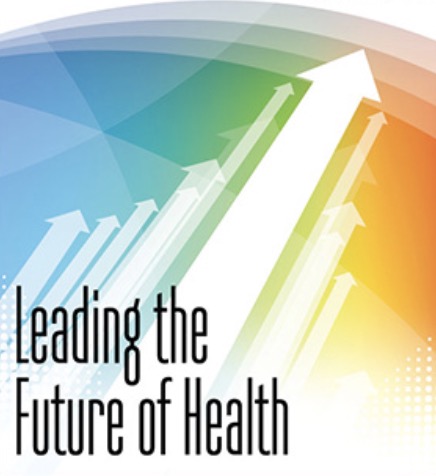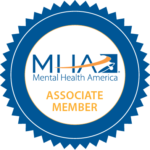
The BIG Question:
What is the future of health care? And how will behavioral health fit in?
- What services will we provide? Whom will we serve?
- How will consumer and clinician roles evolve?
- How will our increasingly diverse population change what we do?
- How will technological innovations factor in?
- How will we be paid?
- What kind of leadership will we need to deliver – both within our field and in the larger system?
- And who will “we” be, anyway?
In Santa Fe, we will step back from problem solving the “now” and look at the trends pushing and pulling us into the future. The 2014 Summit will challenge us all to think as futurists. We will examine key trends in health and the larger forces driving them – both in the field and in society. We will identify challenges on the horizon, resources available to meet them, and strategies for leading the unfolding future. You will come away with a clearer and inspired understanding of the forces shaping the future of health and how you must adapt your leadership tack today. We invite leaders of health homes, public health, family physicians, health care, behavioral health, addiction services, and community wellness to join us to focus on the skills and experiences required to lead and transform health.
The Work
We will spend Summit in symposia conversations, framed by two plenary presentations. Participants will select a symposium to engage in for the duration of Summit. Each symposium will focus on a single key topic, providing the opportunity to engage in meaningful, courageous, and deep conversation about an aspect of health and health care in the future. Several times during Summit, participants will convene by symposium to dig into the key trends and forces propelling us into the future, as well as the likely emerging scenarios for where they will take us. Participants will also share information across symposia to build on and inform each other’s thinking. Symposia are:
“There’s No Business Unless You Show Me the Business”—The Imperative to Articulate, Construct, Fund, Implement, and Operate Business Models in the Post-ACA Digital World
Gina Lasky, PhD and Christopher Wilkins, MHA
Join this symposia to define and discuss, within the context of major environmental forces, the behavioral health and recovery community’s mutual imperative for advancing viable business models; the outputs that said business models must produce; affiliation, collaboration and relational strategies and accountability models; emerging practices demonstrating track records of operation, integration and monetization; and to summarize a “play bill” of the necessary actors, roles, sets, theatre environment, ticket charges, and administrative support necessary to launch the next evolution of your business model!
Shaping the Future Agenda for Behavioral Health Policy; What do We want? How do we get It?
Mady Chalk, PhD and Pamela Greenberg, MPP
Join this symposium and help pinpoint future behavioral health policy issues, identify focused strategies to lead policy change, and move toward effective behavioral health care in a new environment.
The Power of the Person in the Future of Health
Jen Padron, MEd, CPS, QMHP-CS and Ron Manderscheid, PhD
Explore the future role of the person receiving care and the impact that individual action can have on health outcomes, cost, and whole health. What do the increasing practices of shared decision-making and the concept of mutuality tell us about future individual responsibility for health? We will hear about emerging innovative routes of engagement and practitioners’ reactions, learn of techniques and technologies that facilitate personal management of health, and surface the implications for behavioral health and the learning behavioral health can contribute to the future of health care.
The Times They Are A-Changin’: Forming Unfamiliar and Even Difficult Partnerships to Create Innovation in Service Delivery
Terri Hurst, MSW and Sharon Raggio, MBA
Come and share ideas and innovations about collaboration! In this new world, we have ample opportunities for different, new, and deeper collaboration. Who might be new partners besides the usual and customary folks we deal with? Are there new topics for the usual collaborations? How do we shift the paradigm so we are not in the same box or viewed as being in the same box? What exactly is collaboration in this new future environment and are there new skills or best practices?
Innovation: A New Ecology of Behavioral Health Leadership in the New Age of Health
Steve Scoggin, PsyD, LPC and Keris Myrick, PhD
Join us for this interactive experience to think globally about innovative leaders and the barriers that keep us from expanding our mindsets. Attention will be on the exploration of future behavioral health innovation as we move from a sick care model to a health care delivery model. Particular attention will be placed on innovations that can accelerate and improve the quality of care while impacting cost such as new models of community collaboration, technology, and peer specialists.
Making Health Care Whole: Getting Integration Unstuck
Johanna Ferman, MD and Dale Jarvis, CPA
Get ready to be energized as we explore critical questions and barriers to the future of integrated behavioral and physical health care – a core paradigm shift in how we think about, plan for, capture and use information as we drive towards pay-for-performance reimbursement and deliver care in health reform’s Triple AIM environment.
Join us to address key questions that can make or break our success, including: what are the financial barriers including carve-in/carve-out? what supports front-end transformation/ what are the potential pitfalls where theory meets operational realities? how do we see beyond the narrow confines of current practice now and into the future? what are the vital functions for leadership in removing roadblocks? what is the role of information in driving transformational change?
The Takeaway
You will leave the 2014 Summit with an understanding of how the issues you’re tackling now link up to larger trends in health care. You will have a clearer sense of how these trends influence the trajectory of health and where and how behavioral health must connect. Most importantly, you will be on the road to understanding how to position your work today to lead tomorrow.
Keynote Presentations
- The Future of Health Care: Entering the Shift Age – David Houle
- Multi-sector Leadership Now and in the Future – AJ Robinson, PhD
Symposia Possible and Probable Futures – Discussion Outcomes
- Symposia Synthesis
- There’s No Business Unless You show Me the Business – The Imperative to Articulate, Construct, Fund, Implement, and operate Business Models in the Post-ACA Digital World
- Shaping the Future Agenda for Behavioral Health Policy: What do we want? How do we get it?
- The Power of the Person in the Future of Health
- The Times They Are A-Changin’: Forming Unfamiliar and Even Difficult Partnerships to Create Innovation in Service Delivery
- Making Health Care Whole: Getting Integration Unstuck
- Innovation: A New Ecology of Behavioral Health Leadership in the New Age of Health
Listening/Conversation Arc Feedback
Each Summit symposium dialogue – while centered around a specific theme – also had a number of similar/overlapping conversations. Those were captured in “conversation arcs” and feedback from those conversations is captured in the links below.
- Thought Patterns/Assumptions/Values
- Economic and Financing Issues, Challenges, Models
- Workforce Issues
- Peer and Family Participation and Recovery
- Technological Innovations
Symposia Resources
The Times They Are A-Changin’: Forming Unfamiliar and Even Difficult Partnerships to Create Innovation in Service Delivery
– Terri Hurst, MSW and Sharon Raggio, MBA
- Simon Sinek – How Great Leaders Inspire Action
- Collaborative Leadership: A Foundation for Success
- Slide Deck – Collaborative Leadership
Innovation: A New Ecology of Behavioral Health Leadership in the New Age of Health
– Steve Scoggin, PsyD, LPC and Keris Myrick, PhD
Topic Areas and Associated Resources
- Technology
- Leaders of the Future: Innovative and Adaptive Leadership
- From Treatment to Healing: Building Webs of Trust
- Money in, Money Out – (new payers and funding mechanism)
Short Videos
- Symposium Overall Approach: Appreciative Inquiry – An Introduction
- Topic 1: Conference Call in Real Life
- Topic 2: Everything is Not a Nail
- Topic 2: How to Lead a Movement
- Topic 3: Lars and the Real Girl Trailer
Documents
- Appreciative Inquiry Interview Protocol: Raising and Celebrating Excellence, Learning and the Spirit in Health Care
- High-Impact Leadership: Improve Care, Improve the Health of Populations, and Reduce Costs (Institute for HealthCare Improvement 2013)
- The Strategy That Will Fix Health Care: Providers must lead the way making value the overarching goal (Michael E. Porter and Thomas H. Lee, Harvard Business Review, October 2013)
- Manatt’s Healthcare Industry Megatrends
Making Health Care Whole: Getting Integration Unstuck
– Johanna Ferman, MD and Dale Jarvis, CPA
- Integrated Behavioral Health in Primary Care: Evaluating the Evidence, Identifying the Essentials. Talen, Mary R., Burke Valeras, Aimee (Eds.) 2013, XXII, 354 p. 24 illus, 8 illus in color
- “Fostering Sustainable, Integrated Medical and Behavioral Health Services in Medical Settings,” Ron Manderscheid, PhD; and Roger Kathol, MD. Ann Intern Med. 2014;160(1):61-65-65. doi:10.7326/M13-1693. Article and Author Information
- Peek CJ and the National Integration Academy Council. Lexicon for Behavioral Health and Primary Care Integration: Concepts and Definitions Developed by Expert Consensus. AHRQ Publication No.13-IP001-EF. Rockville, MD: Agency for Healthcare Research and Quality. 2013.
- Why Zebras Don’t Get Ulcers, by Robert M. Sapolsky
The Power of the Person in the Future of Health
– Jen Padron, MEd, CPS, QMHP-CS and Ron Manderscheid, PhD
- The Power of Person – PowerPoint Slide Deck from Symposium Facilitators/Speakers
- Essential New Roles for Peers and Service Recipients in the Whole Health Era
- Swarbrick, M. (2013, August 1). Integrated Care: Wellness-Oriented Peer Approaches: A Key Ingredient for Integrated Care.
- Vestal, C. (2013, September 11). ‘Peers’ May Ease Mental Health Worker Shortage under Obamacare.
- Peers and Leadership: An Excerpt From the White Paper “US Peer Leadership and Development.” National Association of County Behavioral Health and Developmental Disability Directors Newsletter, February 27, 2014.
- Supported Decision-Making: An Agenda for Action.
David Houle
David Houle is a futurist, thinker and speaker. Houle spent more than 20 years in media and entertainment. He has worked at NBC, CBS and was part of the senior exes also nominated for an Academy Award. Houle is consistently ranked as one of the top futurists and futurist keynote speakers on the major search engines and in the world today. In the last three years he has delivered keynotes on six continents and twelve countries. He is often called “the CEOs’ Futurist” having spoken to or advised 2,000+ CEOs and business owners in the past four years. In February 2010 he also became a featured contributor to Oprah.com and his column can be found at www.oprah.com/davidhoule.
His first book, the influential and highly acclaimed “The Shift Age” was published in 2008. His second book, “Shift Ed: A Call to Action for Transforming K-12 Education” was published in April 2011 by Corwin. His third book, “The New Health Age: the Future of Healthcare and Medicine in America” was published by Sourcebooks in December 2011 and became a #1 category best seller on Amazon. . His fourth book, “Entering the Shift Age” was published by Sourcebooks in January 2013 and reached #1 best seller in the category of Business Planning and Forecasting. Houle is a member of the faculty and the futurist in residence at the Ringling College of Art + Design.
Alonford J. Robinson, Jr., PhD
Dr. Robinson is Chairman and CEO of Symphonic Strategies™ Inc., an organizational and community development firm based in Washington, DC. Symphonic Strategies™ works with people from all walks of life to help them lead and transform the organizations and communities around them. He leads a team of diverse and gifted individuals who specialize in crafting compelling messages, researching the ideal state, developing agile leadership, cultivating social enterprise, searching for interdisciplinary insights, mapping political ecosystems, engineering collective action, and incubating social movements. Their clients include leaders in the public and private sectors, with a focus on national philanthropic organizations and large public agencies in the federal government.
While at the Corporate Executive Board, a leading international business strategy firm, Dr. Robinson delivered keynote remarks and led organizational strategy seminars with C-level audiences (CEO, CMO, CTO, etc.) in more than 150 organizations in over a dozen countries throughout Europe and North America. His area of expertise was corporate strategy, marketing, and human resource management.
Dr. Robinson has also been a consultant to the PBS show Frontline, served as a staff writer on the Encarta Africana Encyclopedia of the Black Diaspora, and is an adjunct professor at the Center for Excellence in Public Leadership (CEPL) at the George Washington University in Washington, DC. At CEPL, his courses and seminars include topics that range from strategic management, organizational transformation, executive decision-making, and leading change initiatives. He delivers regular seminars and courses to public sector leaders in federal, municipal, and local government agencies. He also provides strategic coaching for senior executives and emerging leaders across his client portfolio. Dr. Robinson holds a Ph.D. in Government from Harvard University and dual bachelor’s degrees in social psychology and political science from Stanford University.


